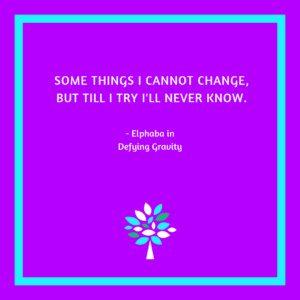Quote from Wicked

Wicked the music is wonderful and as I sat there watching it this weekend, I was reflecting on why I love it and why it resonates with me, and likely for others.
There are so many good messages in this musical. The most obvious theme is that of being yourself. Elphaba (the Wicked Witch) is judged from the moment of her birth by her green skin, something she was born with. That of course echoes the experiences of LGBTQIA+ folx. Too often the message from society, faith communities and families, is that these individuals are somehow wrong or bad because of who they are. In Wicked, there comes a time when Elphaba realizes her voice, realizes her power and goes through an awakening. That is where this line from Defying Gravity comes in.
This scene It gets me every time, I get chills and tears, for the best reasons! It is at this point that Elphaba decides to stop playing by the rules of someone else’s game and figure out her limits for herself. There is a definite political allegory aspect to the play. The reason that Elphaba has her awakening is that she wants to fight for the animals that don’t have a voice. She has now found her voice and uses it to fight for those who could not. I love it when people find their voices and realize their power. We see that with the high school kids from Parkland who survived their school shooting and are now out there making their voices heard and trying to affect change.
All of us, we are more powerful than we realize. This is especially true of the individuals I work with who come from abusive, neglectful or chaotic families. Just like Elphaba, they have been taught to see themselves as wicked, not good enough, or damaged. Often my clients find their voices in speaking up for others less powerful than them. At one point in the play, Glinda asks Elphaba to tell her a secret and Elphaba discloses her belief that it is her fault her sister was born with damaged legs.
This is the message that Elphaba has been by her family and it becomes part of her story. Just like my clients who have been abused, they have been convinced that it is their fault. But Glinda sees right through it and tells Elphaba that it may be her secret but that doesn’t make it true. This is such a powerful message in such a quiet moment of this play, but it is profound. This is the first time anyone has questioned the narrative Elphaba has been given about herself. In the real world it is often not until adulthood and maybe not until entering therapy that people first hear this message.
Helping clients to learn that in spite of what they have been led to believe, that it was not their fault is a game changer. The idea that the blame actually lies with the perpetrator can be hard to believe. This is one of the biggest tasks of therapy, helping people understand the actual limits of their responsibility for what happened to them. They may have gotten in the wrong car, trusted the wrong person, or been under the influence, but that does not make them responsible for what happened. No one deserves abuse for making a bad decision. No one deserves abuse for simply being born into a toxic family. No one deserves abuse because of their identity. No one deserves abuse. Period. Full stop.
And then the last theme of the play that I want to highlight is the power of relationship. Elphaba and Glinda become friends and each has a profound and beneficial effect on the other. They help each other to grow and become better, stronger people. Healthy attachment figures do the same thing for us. Attachment is a deep and enduring emotional bond that connects one person to another, across time and space. In an ideal world, those who raise us are healthy attachment figures, but that does not always happen. Having at least one person growing up that is a support can help buffer the negative outcomes of growing up with trauma, abuse or neglect. Having a good friend makes us better, healthier people. Sometimes the first healthy attachment figure is the therapist. And the single most important ingredient in any therapy is the quality of the relationship. That is what heals.










